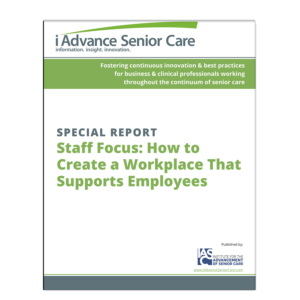CNA RECOGNITION The Ralston Center Caregiver Award
On October 19, 2006, the cheerful buzz of a hundred voices filled the Ralston Center auditorium in Philadelphia. The lively crowd was assembled to celebrate the achievements of the eight winners of the Ralston Center Awards Program in Geriatrics 2006 Caregiver Awards.
In 2004, Ralston Center, an organization that offers programs to help seniors maintain healthy, independent lifestyles, inaugurated the Caregiver Award to recognize certified nursing assistants (CNAs) working in long-term care facilities located in Ralston’s West Philadelphia neighborhood. “Our goal is to honor a job well done by nursing professionals who perform an important service in healthcare,” says Francis R. Strawbridge, president of the Ralston Center Board of Managers. “In addition to recognizing their daily efforts, which are often underappreciated, Ralston Center wants to provide an incentive to caregivers that will have a positive influence on the care provided by all certified nursing professionals.”
The Awards Program in Geriatrics continues Ralston Center’s long history of service to the elderly. Founded in 1817 as the Indigent Widows and Single Women’s Society by Sarah Ralston, Ralston Center’s mission is to develop services that address the medical, mental health, and quality of life needs of older adults and to engage and assist in research and education in the care of the elderly. Ralston Center has refined its services over the years to accommodate prevailing needs in services for older adults. While no longer a provider of housing itself, the organization maintains a firm commitment to programs that enhance quality of life in aging.
The Caregiver Award encourages “quality of life in aging” through a very personal and focused acknowledgment of CNAs who exemplify the highest standards of compassion, commitment, and excellent care for their patients. In establishing the Caregiver Award, Ralston Center sought the support and participation of eight residential nursing facilities in its West Philadelphia neighborhood. In the initial year, 2004, some administrators needed gentle convincing to participate in the program—while there was universal enthusiasm for the idea, here was “one more thing” already taxed staff were being asked to do. And since Ralston asks each facility to devise its own process for selecting the recipients, the program requires thought-ful input by each nursing home.
For its part, Ralston Center representatives attend award ceremonies at each nursing home and provide a plaque inscribed with the name of each awardee to be installed in a prominent place in each facility. Ralston also hosts a catered reception at Ralston House. At this annual event, attended by families of the award winners and administrators of the nursing homes, each Caregiver Award recipient is presented with a framed certificate and a $500 cash award.
In some facilities, selecting the year’s recipient has become a community project. Sharon Whitaker, RN, CNDLTC, NHA, is director of nursing at the 58th Street Presbyterian Home, a 59-bed nursing and rehabilitative health center in Southwest Philadelphia. She cites camaraderie at the facility as the most important outcome of the Caregiver Award program: “The entire management team was involved in the nomination process for the Caregiver Award, but the entire community voted to choose the recipient. It was an exciting time for all. The most wonderful thing is that this year, Reitha Ellis-Broaddus, the CNA who was chosen, received 90% of the votes, so the whole team was very pleased with the outcome.”
All the nursing home administrators emphasize good attendance, punctuality, attention to residents’ needs, and solid nursing skills as necessary starting points for candidates being considered for the award. Traits shared by award winners include an extra measure of pride in their work, a special ability to communicate with and advocate for patients, and a talent for cooperating with and supporting other staff members.
Ellis-Broaddus, the 2006 Caregiver Award winner from the 58th Street Presbyterian Home, was cited for her “near saintly” skills in dealing with angry or frustrated family members. Her composure manifests in other ways as well; her supervisors noted that she encourages residents to perform at their highest level of independence. “She does this in a dignified, professional, and sensitive manner,” said her nomination letter—and these traits are commonly and consistently noted among all Caregiver Award recipients.
Whitaker also notes that, after three years, the Caregiver Award is generating interest and questions among the CNAs themselves. She says that she has seen more of an individual interest among CNAs wanting to be considered for the award. “After the list of nominees was posted this year, I had numerous inquiries from CNAs asking why they had not been nominated. So, after taking the time to review employee files, I was able to give each person a concrete reason—attendance problems, write-ups for care issues, and the like. It has been another opportunity to teach and help our CNAs set goals,” she says. “I have seen some definite and positive changes in some caregivers who desire to receive the award and have their names added to the plaque in our nursing home. As for the CNAs who have won the award, the level of self-esteem, pride, development of leadership skills, and desire for autonomy has gone through the roof!”
Bob Gilbert, human resources director at St. Ignatius Nursing Home, a nonprofit 176-bed facility, has also appreciated the training and coaching opportunities the Caregiver Award has presented. “St. Ignatius has typically selected a CNA who performs well despite a lack of recognition, but the Ralston Caregiver Award highlights the importance of specific attributes from an industry-wide perspective,” says Gilbert. “The effect it has on staff is that they question why this person was nominated. The questions give us the opportunity to emphasize the specific qualities that are outstanding in this individual.”
project.
Another aspect of the award that Gilbert appreciates is that it “provides recognition for a deserving CNA beyond the resources available to the nursing home on its own. We appreciate the ability to recognize a special person in a way that exceeds our means.” He reports that in the weeks surrounding the announcement of the nominee from St. Ignatius, there was energized discussion regarding why this person was selected over others. Beyond enabling administrators to highlight particularly outstanding aspects of the nominee’s performance and how important that behavior is to our residents, “the Ralston Caregiver Award takes this recognition to another level,” Gilbert says. “It reinforces the important roles that CNAs play in the quality of resident life. The Ralston Caregiver Award is now recognized by staff and thought of as something prestigious.”
Shannon Kinne, administrator at Kearsley Retirement Community, which has an 84-bed skilled nursing unit in addition to its independent and assisted living settings, believes that the most important outcome of the Caregiver Award is that it motivates nurses’ aides to excellence: “The recipient of the award has expressed gratitude for the recognition of her daily efforts, and her peers are inspired to perform at the same high level of service.” After three years in the program, Ralston Award winners at Kearsley “have gained confidence and leadership from the experience,” Kinne says. “Their recognition has helped confirm quality standards for the nursing staff and establish the winners as respected leaders among their peers.”
For further information, phone (215) 386-2984 or visit https://www.ralstoncenter.org. To send your comments to the author and editors, e-mail phillips0307@nursinghomesmagazine.com.
Related Articles
Topics: Articles , Staffing











